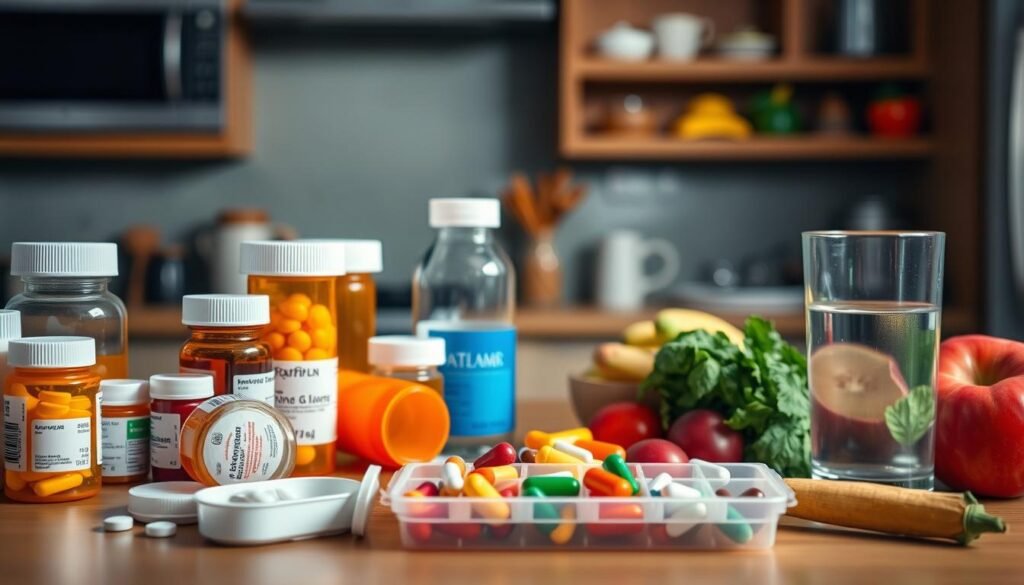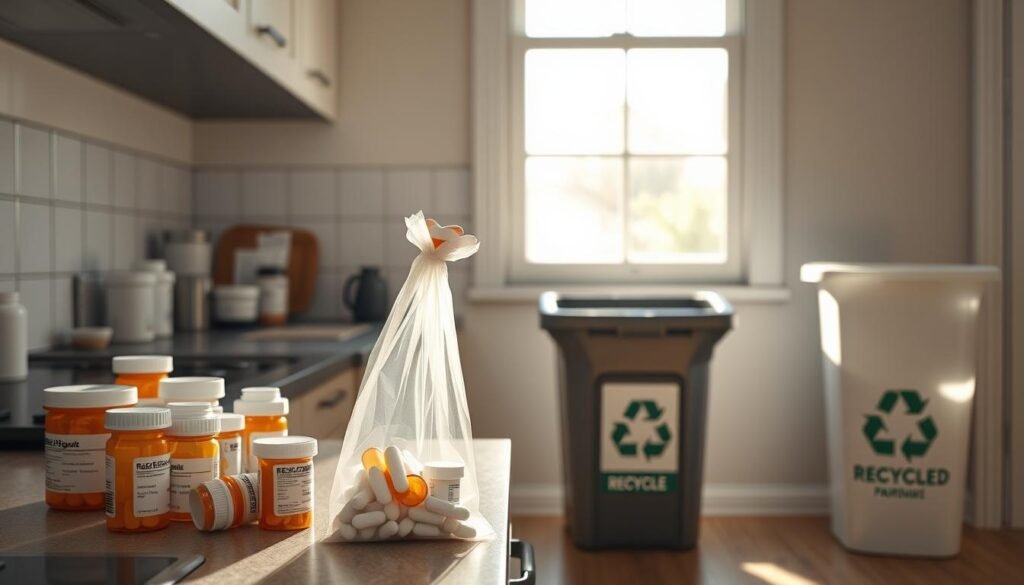Did you know around 70% of Americans get at least one prescription each year? This fact shows how crucial managing medications is for better health. As people deal with many treatments, understanding medication management is key for their well-being.
In this guide, you’ll learn important ideas and tips about handling your meds. You’ll find out how to keep an up-to-date list of your medications and set reminders. This article will help you make sure you’re taking your medications correctly, which is very important for staying healthy.
Key Takeaways
- Effective medication management is essential for health maintenance.
- Keeping an updated medication list helps prevent adverse interactions.
- Pill organizers can enhance treatment adherence.
- Regular communication with healthcare providers is key.
- Adjusting dosages can alleviate undesirable side effects.
- Safe disposal of medications is vital for community health.
Understanding Medication Management
Medication management is key for safe and effective treatment. It means organizing your meds to avoid mistakes and improve health. It’s about knowing what your meds do, how and when to take them, and their interactions.
A lot of adults in the U.S., especially those over 40, take many prescriptions. This fact shows why handling meds well is vital, especially for those with ongoing health issues. Having your meds checked every year helps see how your body handles them, which can change as you get older. Some meds need to be stopped slowly to prevent problems.
Getting advice from healthcare providers is important for a good treatment plan. Be open about all the meds you take, including over-the-counter ones. This helps doctors tailor your medication plan. Knowing how drugs interact is key to a successful treatment.
- Medications can lower heart disease risks by managing blood pressure and cholesterol.
- Those with mental health issues benefit from careful medication management too.
- Teamwork among healthcare professionals ensures good medication management.
Being aware of side effects helps catch bad reactions early. Tailored medication management is often needed for the elderly and those with memory issues. This is crucial to prevent mistakes, especially with multiple meds or frequent changes.
| Aspect | Importance |
|---|---|
| Understanding Medications | Essential for proper usage and preventing interactions |
| Annual Medication Review | Addresses changes in absorption and breakdown |
| Gradual Discontinuation | Avoids complications from stopping medications abruptly |
| Healthcare Provider Communication | Ensures all medications contribute to a cohesive treatment plan |
Good medication management is crucial for patient safety and better health. By working together, healthcare providers and patients can manage meds more effectively.
Importance of Keeping an Updated Medication List
It’s vital to keep a medication list up-to-date for effective prescription handling. This list helps people stay on top of their treatment plans. For those with chronic conditions, a well-organized list can improve their health significantly.
What to Include in Your Medication List
Your medication list should have these important details:
- Name of the medication
- Dosage
- Frequency of intake
- Over-the-counter medications
- Supplements and vitamins
Adding both prescribed and over-the-counter items gives a complete view of your treatment. This is vital to avoid drug interactions.
Benefits of a Comprehensive List
A good list helps avoid drug interactions, ensuring all medicines work well together. It also improves how well patients follow their treatment plans. Plus, it makes talking with doctors about treatments easier.
Keeping your list current lets you manage your health better. For more on why taking meds properly is important, click here.
Utilizing Pill Organizers for Better Adherence
Pill organizers are key to managing health effectively. They make taking medication simpler and more consistent. By sorting medications in advance, these tools prevent missing or doubling doses. This leads to better health routines.
Types of Pill Organizers
There are several types of pill organizers for different needs:
- Daily Organizers: Good for those taking medicine once a day. They have compartments for each dose.
- Weekly Organizers: These have seven sections for organizing a week’s medication at once.
- Monthly Organizers: Best for complex schedules, allowing planning for a whole month.
- Automated Pill Dispensers: They dispense doses on time and give reminders. Great for managing multiple medications.
How Pill Organizers Help
Using pill organizers can improve how well people stick to their medication plans. Studies suggest adherence rates can improve from 63% to 71% with these tools. This is because it’s easier to manage medications visually. It’s essential for good health management to avoid missed or incorrect doses.
Effective medication management, like using pill organizers, lowers the chance of missed doses. This helps avoid worse symptoms or unnecessary hospital visits. This is very important for people with mental health issues. Pill organizers boost medication effectiveness and improve well-being.
Adjusting Dosages, Switching Medications, and Lifestyle Tips
Managing medication is more than just pill-taking. It includes adjustments in dosages, changing medications, and following lifestyle advice to boost treatment success. Sometimes, due to health changes, side effects, or drug interactions, changes are needed. This makes talking to healthcare providers very important for managing health well.
When to Consider Adjusting Dosages
Adjusting dosages may be needed for several reasons. For example, losing weight can change how much medication you need. If you lose 5 to 10 pounds, you might need less medicine. Older adults also might need changes since they can be more sensitive to drugs. Talking to doctors during these times is key.
Guidelines for Switching Medications
Changing medications needs careful steps to avoid bad effects. Switching antidepressants, for instance, could lead to withdrawal signs like restlessness. Gradually stopping the old medication over four weeks can help. After stopping, wait 2 to 5 days before starting a new one to avoid serious problems like serotonin syndrome. Always talk to a healthcare provider before making changes to ensure the new medication works right.
Lifestyle Tips to Enhance Medication Effectiveness
Lifestyle changes can make your medication work better. Exercise supports health and can help drugs work better, like insulin. What you eat, including certain fruits and vegetables, can also play a role in medication effectiveness. Knowing about food and drug interactions and keeping up with doctor visits is necessary. For more help, check out information on adjusting to new medication for useful tips.

| Factor | Impact on Medication |
|---|---|
| Weight Loss | May necessitate dosage adjustments for diabetes and hypertension medications |
| Age | Older patients may need lower doses due to increased sensitivity |
| Exercise | Can enhance medication absorption, particularly insulin |
| Diet | Specific foods may interact with medications, affecting effectiveness |
| Tapering Off | Gradually adjusting dosage helps avoid withdrawal symptoms during medication changes |
Setting Reminders for Medication Doses
Having reminders for medication is very important. It helps people remember their daily doses. Studies show many people forget to take their meds. This can be up to 46% of the time. But, with the right reminder strategies, this can be greatly improved. Finding ways that fit into each person’s daily life is key.
Techniques for Effective Reminders
To make a good reminder system, there are several options:
- Smartphone Alarms: Using alarms on your phone can cut down on missed doses. It’s a good way to keep on track.
- Calendar Alerts: Digital calendars help by giving visual reminders. They are great for keeping organized.
- Visual Cues: Sticky notes placed around your home can remind you to take your medicine.
Apps and Tools for Medication Tracking
There are tools and apps that really help people stay on track with their meds. A 2019 study showed that reminder apps make a big difference. They listed some apps that are very helpful:
| App Name | Features | Platform |
|---|---|---|
| Medisafe | Custom reminders, dosage management, refill alerts | iOS, Android |
| Pill Reminder | Medication tracking, personal profiles, family notifications | iOS, Android |
| MyTherapy | Health tracking, reminders, journal logging | iOS, Android |
Using these tools can make a huge difference. They make it much easier to remember daily meds. Amazingly, text reminders boosted adherence from 46% to 5% in two weeks. By integrating technology into their routine, fewer doses are missed. This leads to better health overall.
Communicating Effectively with Healthcare Providers
Managing medications safely is crucial. It requires effective communication with healthcare providers. This helps in making informed decisions together.
Knowing what questions to ask is key. It boosts understanding and education about medication plans.
Key Questions to Ask About Your Medications
It’s important for patients to feel confident asking their healthcare providers about medications. Questions to consider include:
- Dosage instructions and timings.
- Potential side effects and what to do if they occur.
- How prescriptions may interact with existing medications or conditions.
- Reasons for choosing a specific medication over others.
- Alternatives available if the prescribed medication isn’t suitable.
Asking these questions helps improve communication. It also reduces wrong information and boosts sticking to medication plans.
Importance of Regular Medication Reviews
Regular medication checks are essential, especially for those on multiple meds. For example, in Sweden, 45% of those 75 or older take five or more medications. Such monitoring is vital.
These reviews let healthcare providers check the need for each drug, watch for drug interactions, and adjust doses. Educating patients during these reviews helps keep them safe and improves drug use habits. This can reduce drug-related problems, which cost up to 20 billion SEK a year in Sweden.
| Factor | Importance |
|---|---|
| Effective Communication | Reduces medical errors and enhances medication safety. |
| Regular Reviews | Ensures treatment plans remain relevant and effective, especially in older populations. |
| Patient Involvement | Promotes better understanding and adherence to medication regimens. |
Patient involvement in healthcare leads to better conversations with providers. Clear and ongoing communication helps in managing medications effectively. It makes patients feel more in control of their health.

Storing Medications Correctly
It’s key to store medicines right to keep them working. Safe storage keeps them effective and safe. Keep them in a cool, dry spot away from light and moisture. Some need to be in the fridge to stay potent.
Best Practices for Storage
Good storage methods are crucial for medicine to last and work well. Here are some tips:
- Store medicines in their original containers to avoid any damage or mixing them up.
- Keep them out of damp places like bathrooms, as moisture can lower their effectiveness.
- Always check the expiration dates and properly throw away any that are old or unused.
- When traveling, keep medicines in your carry-on in their original bottles with the prescriptions.
- If you’re diabetic, take a doctor’s note about your condition on flights.
Common Storage Mistakes to Avoid
Knowing what not to do can also protect your medicines:
- Don’t leave medicines in a car’s glove box since extreme heat or cold can harm them.
- Avoid using medicines that look, smell, or feel different than they should.
- Don’t use pills that are clumped together, look odd, or are damaged.
- Get rid of old medicines safely by mixing them with coffee grounds or kitty litter, then throwing them away in a sealed plastic bag.
To avoid medicine mistakes, have a good storage and management plan. For tips on improving adrenal health through lifestyle changes and supplements, click here.
| Storage Location | Impact on Medications |
|---|---|
| Bathroom Cabinet | Humidity can decrease potency and lead to premature expiration. |
| Car Glove Compartment | Extreme temperatures may damage active ingredients. |
| Original Container | Prevents misidentification and damage of medications. |
| Refrigerator | Some medications require cool storage; check specific instructions. |
Disposing of Medications Safely
Disposing of medications the right way is very important. It stops accidental use and protects our Earth. Not everyone knows that not throwing away unused or expired meds properly can be dangerous. It can harm our health and environment.
Throwing medicines away in the wrong way can pollute water and harm animals. It is key to know and use the right ways to throw away meds. This keeps people and the environment safe from harm.
Why Safe Disposal Matters
Many get prescription medicines like opioids from friends or family. They use them for reasons not related to their health. This is risky as it makes strong medicines too easy to get. Teaching everyone how to dispose of meds safely is very important.
A surprising fact is that 22 states have set up ongoing programs. These programs help people safely get rid of unused meds.
How to Dispose of Medications Properly
There are different ways to safely dispose of medicines. Some, like Demerol tablets and oxycontin, should be flushed down the toilet. This keeps them away from those who might use them wrongly. Other medicines can be taken back to pharmacies that run take-back programs.
Waste management agencies also give tips on how to safely throw away meds. Following these tips keeps you safe and cuts down on environmental damage.

For more advice on using meds safely, check out reliable sites. A good place to start is medication management guides.
Monitoring Side Effects and Medication Interactions
It’s key to watch for side effects and how drugs work together, especially when taking many. Catching side effects early can greatly help in staying healthy. Every drug has different side effects of varying strength. Spotting these soon helps you talk to doctors quicker.
How to Identify Side Effects Early
Knowing the possible side effects helps find them early. You can:
- Read medication guides: The info with your medicines gives important details.
- Document experiences: Writing down any new symptoms helps see patterns from your meds.
- Communicate with healthcare professionals: Going for regular check-ups lets you discuss any health changes or side effects.
The Importance of Reporting Adverse Reactions
Telling doctors about bad reactions is key for safe and effective drug use. It lets doctors change your treatment if needed. They might adjust doses, try new meds, or rethink your health plan. Be extra careful with drug interactions; they can cause unexpected side effects. Like, St. John’s Wort can mess with heart or HIV meds. Vitamin E and warfarin together can cause serious bleeding.
Seeing your doctor regularly helps keep an eye on all meds, including over-the-counter ones and supplements. This thorough checkup keeps you informed about potential issues. It stresses the importance of telling every doctor about all meds you’re taking.
| Medication | Potential Interactions | Side Effects |
|---|---|---|
| St. John’s Wort | Heart medications, HIV drugs, warfarin, statins | Fatigue, digestive issues |
| Vitamin E | Blood thinners (e.g., warfarin) | Increased bleeding risk |
| Ginseng | Calcium channel blockers, statins, antidepressants | Headaches, digestive difficulties |
| Bronchodilators | Shortness of breath relief | Nervousness, rapid heartbeat |
| Cordarone | Zocor (over 20 mg), Coumadin | Muscle injury, liver issues |
| Nasal Decongestants | Blood pressure medications | Increased blood pressure |
Working with healthcare experts and staying alert about your meds makes treatment safer and more successful.
Conclusion
Proactive medication management boosts health and ensures better outcomes. Knowing about medication helps people make smart choices about their treatments. This guide showed why keeping an updated medication list, using tools, and talking with healthcare providers matter.
Following medication plans closely helps with compliance and manages side effects. Studies, like TEAMcare, show the benefits of keeping an eye on blood pressure and glucose. It proves staying committed to your treatment plan is crucial.
Our goal is to give people the power to manage their medications wisely. Making smart choices now leads to better health later. This means informed choices can greatly improve your life quality.